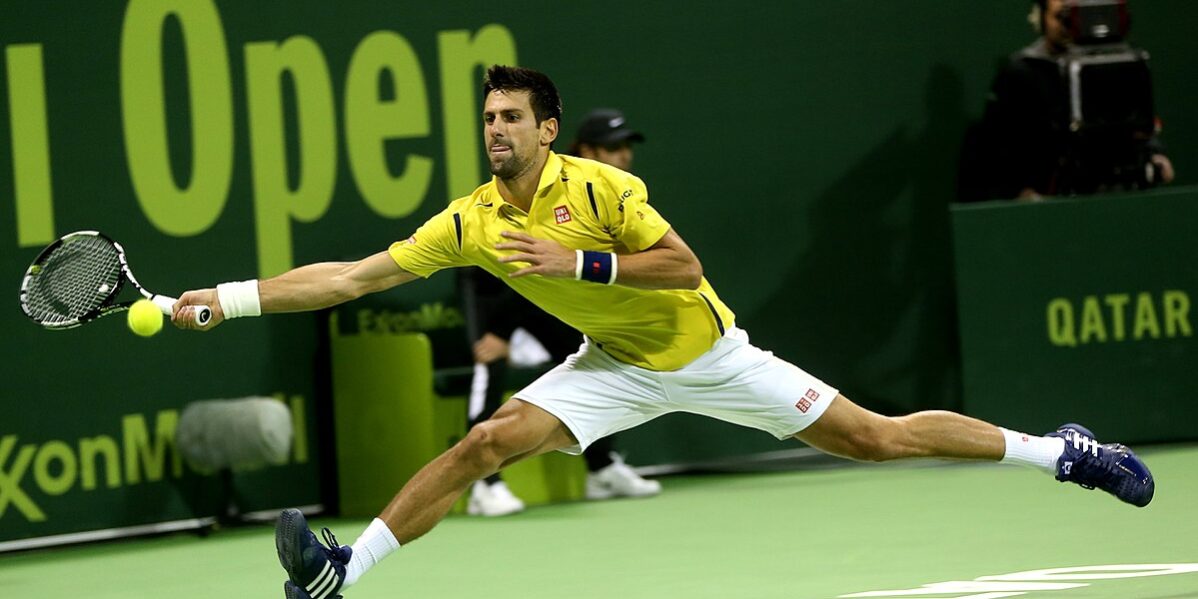The ongoing saga surrounding Novak Djoković’s attempts to enter Australia has dominated headlines across the world. Duška Radosavljević Krojer explores the way the Serbian tennis star’s narrative – and Serbian stories more generally – are represented in the media
The situation surrounding Novak Djoković’s entry into the Australian Open 2022 offers multiple grounds for dramaturgical analysis. There is the thriller-like suspense concerning the legal outcome of his ill-fated trip to Melbourne. There is also the highly contentious public discussion around Novax’s stance on immunisation especially vis-à-vis the Australian population’s observance of some of the toughest series of lockdown measures in the world. The rigmarole was made worse by the knee-jerk pathos of the Serbian authorities on the matter, the Djoković family’s outrageous public behaviour (including the hosting of the toxic British political opportunist Nigel Farage), and the challenges to the tennis star’s moral credibility posed by paperwork issues and the flouting of isolation measures – all of course in the face of necessary scrutiny of someone as rich and successful as the world No.1.
If I wanted to be melodramatic, I might suggest a way of looking at the situation in reference to the Aristotelian apparatus of a hero’s downfall due to his fatal error of character. But I don’t want to be melodramatic. On the contrary, I want us to stop seeing this situation by reducing it to familiar black and white tropes. I want us to find new ways of encountering complexity, because both Serbia and the Western world have a lot of work to do in overcoming the ugly impasse that we are witnessing right now.
Last weekend, during the highly publicised detention of Novak Djoković at a hotel in Melbourne also used to house immigrants, some for years, a Facebook friend of mine posted visual and verbal documentation of the small public unrest taking place outside the Park Hotel, primarily from the point of view of performance studies. According to this documentation, the protesters were of diverse backgrounds and ideological leanings, and were gathered there for a number of different reasons: refugee rights, tennis fandom and Serbian nationalism. This last one of course always ends up being the loudest and the most spectacular trope that immediately and irreparably skews any attempt at balanced representation. Having had to live with this highly negatively charged perception of where I happen to come from for nearly 30 years of living in the UK, ‘Serbian nationalism’ never fails to touch the nerve with me.
‘Is there a more accurate term?’ my friend asked me when I pointed out how quickly people tend to reach for this cultural label without any pause for thought about potential cultural stereotyping. I mean to say: yes, Serbian nationalism is a fact, but not all Serbs are nationalists, or anti-vaxxers or Djokovic fans for that matter. On the other hand, some might even be just tennis fans or even refugee activists too. Can we not allow that being Serbian expands beyond the caricature of nationalism in this otherwise highly sensitive age (see for example, British comedian and author David Baddiel’s views on the cultural representation of Jews.)
No, this is not a matter of the accuracy of terms. The trouble is not so much the label itself, but the fact that it so comfortably, easily and comprehensively sticks. The effective, convincing and reductive shorthand of cultural stereotyping does not allow or call for any nuance, reflection or complexity.
Inevitably when I think about this I draw on personal experiences of sitting at dinner tables of the Daily Telegraph-readers who used to buy me Kenneth Clark’s Civilisation for my birthday, some time in the mid-1990s, staring at silver cutlery and crystal wine glasses while trying to answer their question ‘Has Serbia produced any notable composers, philosophers, authors or scientists? And when I open my mouth to say some names, I know these names will mean nothing to my interlocutors, not even enough to produce an indication of their own ignorance. Nikola Tesla, Ivo Andrić and Mileva Marić would just have been the exceptions that prove the rule. And while, for example, Germans might have been redeemed from their Nazi past through a brutally honest post-war self-reflection, and with the help of their cultural giants crucial to the history of European civilisation, ‘the European backwater’ does not have such luxuries.
Nearly 27 years after the end of the nationalist wars in the Balkans, it seems harder than ever to shake off this legacy. The fact the country is under the leadership only supposedly new but very memorably weaned in those dark times, does not help, but neither does the continued convenience of ignorance, insularity, or the unwillingness on the part of the West to look beyond the stereotypes, forensically and with nuance, at what is actually going on. Notice for example that there has been comparatively little coverage in the English-speaking media of the Serbian public’s vociferous attempts over the past months to resist the neoliberal colonialism of the Rio Tinto lithium mine project initiated in western Serbia.
Thin coverage has historically been augmented by a cultural superiority bias (searching for Serbia in the British Newspaper Archive frequently returns articles whose main message is overwhelming doubt in the political competence of this part of Europe). One could add to this a lack of sufficient general public knowledge and interest in the region. I had a British friend, a person of my age, who did not know that when we were in our mid-20s, back in 1999, his Prime Minister led an unauthorised NATO bombing campaign on my birth country, (which actually happened to be a European country and not some Middle Eastern outlier).
Those early days of the looming stardom of Novak Djoković, Ana Ivanović and Jelena Janković in the first decade of the 21st century carried a promise of an alternative cultural representation even for those of us who had stopped watching tennis when Monika Seleš got stabbed by a crazed Steffi Graf fan in 1993. They were fresh, beautiful and unbeatable. We saw pictures of their troubled childhoods, relentlessly training under the NATO airstrikes, and how they overcame the odds to become tennis champions. But then, as they aged, these players either turned out to be shooting stars (like Ivanović and Janković), or went for the top spot, like Djoković, though not without some sort of a Faustian bargain.
I have not closely followed Djoković’s sporting prowess – so I cannot offer that sort of performance analysis either – but over the years I have seen on YouTube that, unlike most of his arch rivals, Federer, Nadal and Murray, the Serb has actually shown considerable charm and talent of other kinds. He regularly entertains his tennis audiences with impromptu dancing or comic moments, and not infrequently in their own languages, including Chinese. His sense of humour and facility with foreign languages has allowed him to dazzle TV chat show audiences in Spain and in Italy, and he has famously got Jay Leno to join a Serbian dance on TV. The guy is (was?) likeable, he likes to be liked, and I don’t think it is fair to fault him for that. The excess of charm may also have been a compensation for being a ‘Serb’, and it is a trait that has rarely been commented on in these terms, possibly because it does not fit the stereotype.
Although his heart-warming forays into the entertainment industry had all taken place more than 10 years ago, and Djoković has now been the world’s top ranking tennis player for seven consecutive years, he was never been featured as sympathetically in any of the British media. He was required to win Wimbledon four times before he was invited to Jonathan Ross’ popular BBC chat show in 2018, even though Ross is a famous tennis fan. It seems that even the objective measures of one’s success, such as the ATP rankings, sum totals of his wins and trophies can still be eclipsed by cultural perception. It is also a well-known trope that despite his victories on the court, the Eastern European is never perceived as enough of a ‘gentleman’ to really overthrow Federer at Wimbledon. When I share these observations with my British friends, they rarely have anything to say. Or we just change the subject.
Is it the case that deep inside, however well one knows that cultural stereotyping is demeaning, ignorant and wrong, one has to feel permitted in some exceptional circumstances to keep doing it? Maybe when one feels there is plentiful evidence confirming the stereotype to outweigh any other known redeeming features, or when the recipient is anyway privileged in other ways, or when there is no history of a colonial relationship between one’s country and that of the recipient, then it is ok. But does this still justify ignorance? Does it reinforce the Daily Telegraph-reading person’s view that if they are not aware of a history of a culture’s contribution to the civilisation, this history simply cannot possibly exist? Had Djokovic not been Serbian, would it have been so easy to scrutinise or condemn him?
This is in no way to say that Novak Djoković should be exempted from any consequences for his own various ‘fatal flaws’ or errors of judgment. If he falls, he will be cushioned by the prospect of a comfortable lifestyle and other immaterial riches – when the storm blows over there might even be a glittering entertainment career ahead of him.
Dramaturgical analysis, however, is not only concerned with characterisation but also with how we construct performative narratives – and how the audiences receive them. In the 21st century we have thankfully moved beyond formulaic Aristotelian thinking towards a post-dramatic diversification of possibilities and increased audience participation.
What remains to be done in view of the above by the rest of us then is work on cultural perception of Serbia itself. This means work on shedding the preconceptions, and it also means hard work from within: to replace the fallen heroes with small acts of everyday heroism through unsticking from Serbia any continuing evidence for the stereotypes of national arrogance, moral corruption and civilizational exceptionalism.
Main image: Hanson K Joseph
Further reading: On The Matrix: Resurrections as a post-Yugoslav movie
Duška Radosavljević Krojer is a writer, dramaturg and academic. She is the author of award-winning academic monograph Theatre-Making: Interplay Between Text and Performance in the 21st Century (2013) and editor of Theatre Criticism: Changing Landscapes (2016) and the Contemporary Ensemble: Interviews with Theatre-Makers (2013). Her work has been funded by the Arts and Humanities Research Council in the UK multiple times including for www.auralia.space (2020-21) and The Mums and Babies Ensemble (2015). She is a regular contributor to The Stage, Exeunt and The Theatre Times.








